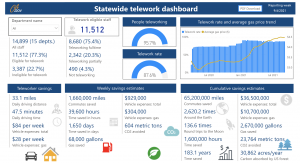The massive shift to remote work during the pandemic shattered the longstanding myth that you can’t properly manage employees if you can’t see them in person.
As agencies hash out long-term plans for supporting a permanent hybrid workforce, there must be guidance and training for all supervisors to ensure that no employee is disadvantaged because of their work arrangements. This will be especially critical when considering raises, promotions and other opportunities for advancement.
Performance management is an essential component of making a successful shift to hybrid work in government agencies. For some supervisors, the pandemic and the transition out of the pandemic will be the first time they’ve balanced a mix of in-person and remote employees.
Let’s look at some key developments in the shift to permanent telework and remote work and the growing attention on equitable performance management in a hybrid environment.
A mandate to adapt agency policies for the hybrid reality
A permanently hybrid workforce is both a cultural and operational shift that will take time to accept and implement. Agency telework policies need to be updated, and systems, resources and trainings need to be created or revised.
The Biden administration has left no doubt that agencies must prepare now for a hybrid government workforce. A June 10, 2021 memorandum (M-21-25) from the Office of Management and Budget (OMB), Office of Personnel Management (OPM), and General Services Administration said, “There is a clear and immediate imperative to reimagine our policies and practices to reflect new realities and effectively serve the American people.”
In a follow-up July 23, 2021 memorandum (CPM 2021-17), OPM made other strong recommendations for agencies to update policies to allow for more inclusive teleworking:
“An agency that has a general bar on teleworking…should reevaluate that policy in light of its experience during the pandemic … Providing teleworking employees with flexibility concerning their hours of work may allow them to meet the obligations of their job while teleworking even while also having child care or other family-related responsibilities.”
Focus on fair and equitable performance management
As government agencies continue the transition to a permanently hybrid workforce, there is a growing recognition that fair and equitable performance management must be a top priority at agencies.
The Biden administration emphasized this concern and offered some specific ideas in the June 10 memo:
“Agencies should provide support for supervisors and employees, including…reentry toolkits, checklists, and training for supervisors on managing hybrid and remote teams and for employees on reentry planning and performance expectations and obligations in a hybrid or remote work environment.”
The federal guidance issued so far largely leaves it up to each agency to determine the specific trainings and support to provide to supervisors and employees. OPM dived into a bit more detail in an appendix to the June 10 memo:
“Agencies can best support the evolution to the post-reentry work environment by guiding managers to understand that for many government jobs, whether the employee is working in the office, teleworking on a part-time or full-time basis, or based remotely is not relevant to performance evaluation.”
“Agencies can…[require] managers to treat all employees fairly and equitably. Supervisors must evaluate employees against their written standards no matter their work schedule or work arrangement. Agencies can prioritize additional training…[and] can also review performance standards to ensure that they measure outcomes and results.”
The July 23 OPM memo provides a set of answers to frequently asked questions related to telework, including advice on making fair and equitable telework determinations (p. 3) and equitably managing poor performers who are teleworkers or remote workers (p. 18).
Gather resources and get planning
Although it predates the pandemic, OPM and GSA’s telework.gov website provides telework trainings for managers. Its telework basic steps include equitability, and several of its resources for telework managers provide guidance on equitably managing a remote workforce, including the sections on results-oriented management and telework and dependent care. Hopefully, this website and resources will be updated soon with more information so agencies can follow through on the Biden administration’s new telework guidance.
While the federal government might be getting all of the fanfare because of the Biden administration’s transformational workforce policies, local governments are also making headway in the policies and infrastructure needed for a permanently hybrid future.
In California, many state agencies and local governments are enthusiastically embracing telework. In a June 2021 staff memo, CalHR Director Eraina Ortega wrote, “It is important for departments to think about how we can effectively and fairly manage staff, regardless of where they work.”
The state of California is following through on that commitment to support a hybrid workforce. It has launched a comprehensive telework guide with resources for employees, managers, IT administrators and organizational leaders. It includes manager and supervisor guidelines, training courses, and a dashboard of data on the impact of telework. Although the guidelines call for the equitable treatment of employees, the dashboard, unfortunately, lacks data on telework-related equity, which is an area for improvement.

The Statewide Telework Metric Dashboard shows potential maximum savings and other telework metrics.
Advocate for equity from within
Plenty of federal, state and local agencies are stepping up as leaders in equitable hybrid workforce management. But, not all agencies will follow those future-focused examples.
There are affinity groups, unions, labor organizations and others who are joining together to support the modernization of federal workforce policies. Here is one example. In a June 21, 2021 letter, the DOJ Gender Equality Network offered a pointed recommendation to the Justice Management Division, advocating for equitable personnel policies to be applied across different parts of the large agency:
“Consistency begets equity, and … workers’ ability to manage their work lives should not be constrained by leaders who create artificial limitations that are not supported by mission-related necessities.”
You may not have to advocate on your own. If you’re a government worker who would like to see better policies on remote work, telework, and equitable performance management of hybrid teams, see if your local employee groups are already organizing around the issue. If you’re a supervisor, be proactive. Ask your agency for guidance, tools, and trainings, and connect with your management peers to share advice and resources.
Lauren Girardin is a marketing and communications consultant, storyteller, and freelance writer based in San Francisco. She helps organizations engage their communities and tell their stories. Her website is laurengirardin.com and you can connect with her on Twitter at @girardinl.






Leave a Reply
You must be logged in to post a comment.